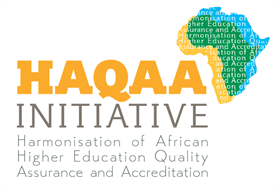Read this in: French
Background
Quality assurance in higher education institutions has been one core basis for revitalising higher education in Africa. The importance of quality assurance in higher education has been recognised as a key area strategic area in the 2063 Agenda of the African Union, which has prioritised a number of tools and measures for harmonizing the African higher education sector and has render it both local responsive and globally competitive. Higher education quality assurance collaboration, and harmonisation more generally, has been also a successful area of collaboration under the Joint Africa-EU Strategy. The aim has been to establish compatible structures and systems which would facilitate academic mobility and foster comparability among qualifications.
As part of the HAQAA Initiative, and in order to support the capacity development of quality assurance agencies (QAA) and systems, four pilot reviews of more established national quality assurance agencies and four consultancy visits to countries with emerging national agencies or the interest to develop one have been conducted in 2018. This exercise has aimed to contribute to the consolidation of quality culture in African higher education and, more specifically, to the Pan-African Quality Assurance and Accreditation Framework (PAQAF). The visits and pilot reviews have utilised the newly developed African Standards and Guidelines for Quality Assurance (ASG-QA) and the review methodology developed within the framework of the HAQAA Initiative.
This important pilot exercise has promoted the consolidation of distinctly African approaches towards quality assurance and accreditation, underpinned by transparent structures and organisations that have had a common understanding on principles and procedures. It has supported the implementation of the ASG-QA in QAAs and QA bodies themselves, so as to render them more transparent, self-reflective and visible to their own constituencies, across Africa and beyond.
This exercise has specifically provided advice and recommendations for national bodies responsible for external quality assurance and encouraged self-improvement. The exercise was not to function as a ranking or scoring tool but as an enhancement led exercise for development. Beyond its formative purpose, it was also be used to revise and improve the African QAA review methodology for application in the future.


